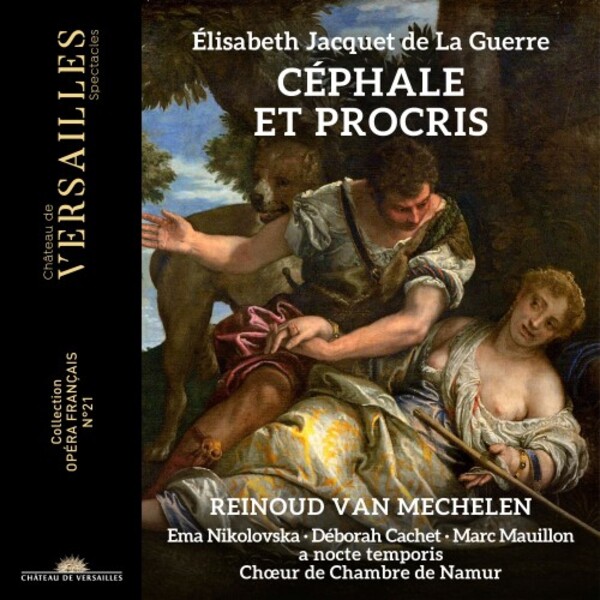DE LA GUERRE Céphale et Procris (van Mechelen)
View record and artist detailsRecord and Artist Details
Genre:
Opera
Label: Château de Versailles Spectacles
Magazine Review Date: 07/2024
Media Format: CD or Download
Media Runtime: 147
Mastering:
DDD
Catalogue Number: CVS119

Tracks:
| Composition | Artist Credit |
|---|---|
| Céphale et Procris |
Elisabeth-Claude Jacquet de la Guerre, Composer
A Nocte Temporis Deborah Cachet, Procris, Soprano Ema Nikolovska, L’Aurore, Mezzo soprano Gwendoline Blondeel, Iphis; Priestess; Nymph, Soprano Lisandro Abadie, Borée; Pan, Bass Lore Binon, Flore; Dorine, Soprano Marc Mauillon, La Jalousie; Sea God; Thracian, Tenor Namur Chamber Choir Reinoud van Mechelen, Conductor Reinoud van Mechelen, Céphale; Nerée, Tenor Samuel Namotte, Arcas, Baritone |
Author: David Vickers
Élisabeth Jacquet de La Guerre’s Céphale et Procris (March 1694) was the first and only full-scale tragédie en musique to be composed by a woman for the Académie Royale de Musique (ie the Paris Opéra). First performed a few months after Charpentier’s Médée (December 1693), it ran for only five or six performances at the Théâtre du Palais-Royal before it was withdrawn. Nevertheless, the music was printed in slightly reduced scoring. The plot is based loosely on Ovidian episodes from Metamorphoses and Ars amatoria. This studio recording is the first to give the complete text without any cuts – unlike Daniela Dolci’s hacked-down and clumsy live account (ORF, 2008). Missing inner-part strings and a few aspects of orchestration have been reconstructed diligently by an editor whose work is unmentioned in the booklet. There is, however, a superb essay by musicologist Catherine Cessac, and, as usual with Château de Versailles Spectacles, everything looks gorgeous: there are on-topic paintings by Veronese, Giordano, Boucher, Fragonard and others, and François de Troy’s portrait of the composer, although necessary stage directions and scenic information from the 1694 printed wordbook are omitted. Careless oversights in the booklet libretto fail to assign several lines to characters correctly, and most of the text in Act 4 scene 3 is missing despite it being a pivotal moment in the performance (the implacable Aurore tells her sidekick Iphis that she is resolved upon cruel revenge).
A Nocte Temporis’s playing applies finesse to juxtaposed sensuality and energy. Ballet movements in the prologue and divertissements move flawlessly between zesty momentum and tenderness. Occasional contributions from an inventive percussionist in quicker dances seldom get in the way. Reinoud van Mechelen juggles functions as conductor and flexible high tenor impressively: there is visceral astonishment, self-pitying anguish, spiteful bickering, misery and, at the close of the tragedy, softly inconsolable heartbreak when Céphale quietly resolves to join his dead lover in the afterlife. Procris’s desperate lament ‘Lieux écartés, paisible solitude’ (Act 2 scene 1) and her duet of sorrowful parting from Céphale (‘Le Ciel m’avait flatté’) are sung sublimely by Déborah Cachet – yet there is plenty of irritation in the argument between the estranged lovers when they accuse each other of infidelity (Act 4 scene 7). Her dying farewell at the opera’s close (‘Non, vivez, je le veux’) makes exquisite uses of silences.
Ema Nikolovska’s darker-hued Aurore is by turns deviously plausible, vexed and saddened, furiously vengeful and ultimately magnanimous. Iphis is performed with polished style and charm by Gwendoline Blondeel. She sets-up the tranquil divertissement for Voluptuousness that forms Aurore’s futile attempt to seduce Céphale: soft dances with intimate textures featuring flutes are interspersed between verses of songs and a chorus of female voices performed delectably, each set piece framing a blissfully translucent passacaille. Lisandro Abadie brings dignity to Borée’s fruitless implorations to the distracted Procris (Act 1 scene 1); his nonchalant pleasure at seemingly having won her hand in marriage is celebrated in a gorgeous pastoral divertissement (Act 2 scenes 4 and 5) that breaks off prematurely upon interruption by the annoyed Céphale. Procris’s confidants Dorine and Arcas, and their affectionate expressions of love for each other, are performed by sweet-voiced soprano Lore Binon and animated baritone Samuel Namotte.
The Namur Chamber Choir is the foremost rent-a-chorus for almost everyone tackling French Baroque operas nowadays; it delivers technical assurance and expressive versatility. The entrance of the valorous Céphale in Act 1 scene 5 is festooned with extraordinarily high yet elegant solo trumpet and timpani, followed by a duet for Athenians sung blithely by Wei Lian Huang and Pauline De Lannoy. When Procris is plunged into hellish torment by the jealous Aurore, the innocent victim’s suffering at the hands of Jealousy, Rage, Despair and a horde of male-chorus demons is hammed up to the extent that they sound more comical than they probably should. However, in every artistic respect, this recording reveals a distinctive landmark in the topsy-turvy history of French Baroque opera in the decades between Lully and Rameau.
Discover the world's largest classical music catalogue with Presto Music.

Gramophone Digital Club
- Digital Edition
- Digital Archive
- Reviews Database
- Full website access
From £8.75 / month
Subscribe
Gramophone Full Club
- Print Edition
- Digital Edition
- Digital Archive
- Reviews Database
- Full website access
From £11.00 / month
Subscribe
If you are a library, university or other organisation that would be interested in an institutional subscription to Gramophone please click here for further information.




